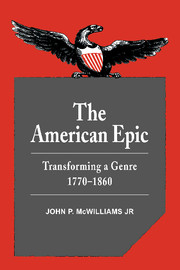8 - “An Epic of Democracy?”
Published online by Cambridge University Press: 22 March 2010
Summary
“The Care & Feeding of Long Poems” was Henry's title for his next essay, which will come out when he wants it to.
A Kennedy-sponsored bill for the protection of poets from long poems will benefit the culture and do no harm to that kind Lady, Mrs. Johnson.
John Berryman, Dream Songs, #354 (1966)Berryman's defensive mockery of his own poem expresses joy in his determined pursuit of an admittedly problematic tradition. The legacy of Whitman's personal epic, it seems, is forever to question its own brashest claims. Works like Leaves of Grass seem the essence of modernist poetic ambition, yet their authors worry whether such poems, taken as a whole, are more than endlessly protracted, self-indulgent dream songs. To assess Whitman's claims upon modern epic demands flexibility without abandoning all terms of definition. As Melville's Mardi reminds us, to ask the question properly may be more important than any answer we might provide.
Durable and persuasive epics may appear in prose rather than verse, may invent legends rather than transmit them, may glorify national destiny or ignore it, may end in heroic death or heroic conquest. Epics may be written or sung, may concern a past history or a present fiction. They may certainly slight the many conventions (Proposition, Invocation, catalogues, similes, type scenes, etc.) that for centuries were considered essential to the epic genre.
- Type
- Chapter
- Information
- The American EpicTransforming a Genre, 1770–1860, pp. 217 - 237Publisher: Cambridge University PressPrint publication year: 1989



